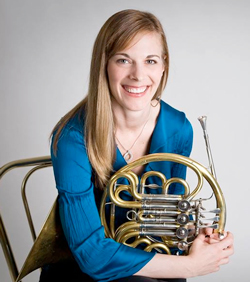by Daniel Hathaway

Cincinnati was first at bat, fielding hornist Elizabeth Freimuth, clarinetist Benjamin Freimuth, and pianist Kimberly Russ in a performance of Reinecke’s Trio in B-flat, Op. 274. A friend of Robert and Clara Schumann, admired by Mendelssohn, and a teacher Liszt entrusted to give his daughter piano lessons, Reinecke directed the Leipzig Gewandhaus Orchestra for three and a half decades, and still found time to write music — lots of it. His numbered works alone run to Op. 288.
The Trio, with its unusual format of a second-movement march and a third-movement scherzo with double trios, is an entertaining salon piece of a sentimental bent. The Freimuths and Russ gave it a masterful, warmhearted performance.
Franz Strauss, in addition to siring Richard Strauss, was a bandmaster and a horn player who was on duty for the premieres of two of Wagner’s Ring operas. His Seaside Impressions is a brief character piece that Elizabeth Freimuth played with a handsome tone and just a hint of vibrato.
The Three Romances, originally for oboe and piano, were composed as love letters from Robert to Clara Schumann. On Monday, we heard them in a version for clarinet and piano, which gave Benjamin Freimuth and Kimberly Russ the opportunity to achieve more tonal drama and a wider palette of color and dynamics.
So far, each work on the program had topped the previous one in terms of musical substance. When Cincinnati finally joined Cleveland (represented by violinist Katherine Bormann, violist Lembi Veskimets, and cellist Charles Bernard) in Dohnányi’s Sextet in C, Op. 37, the evening reached its artistic apogee in a well-crafted work that knew where it wanted to go, and made its journey with style and humor.
The audience recognized quality when they heard it, breathing an audible murmur of approval after the dramatic first movement. A broad, noble march followed, then an entertaining set of variations, and to end, a gleeful finale with a false ending that lured the listeners into premature applause. You could imagine Dohnányi saying, Gotcha! (And the audience saying, So you did!)
Bringing members of two distinguished ensembles together in this kind of program was a clever idea. Let’s hope that the Rocky River presenters are already thinking about a rematch.
Published on ClevelandClassical.com May 16, 2017.
Click here for a printable copy of this article



